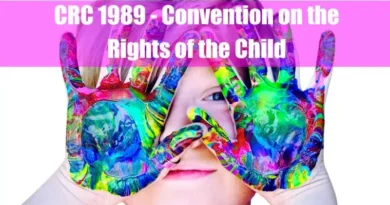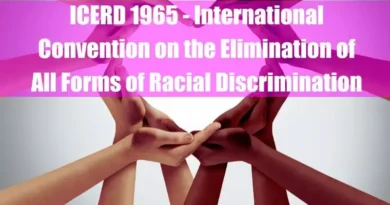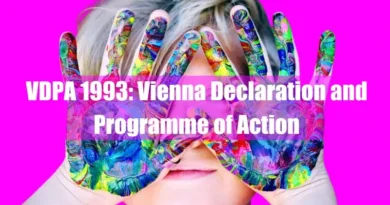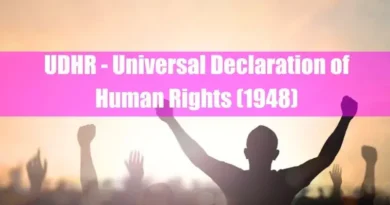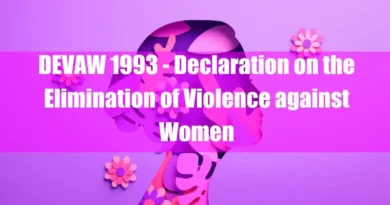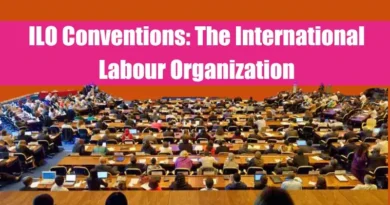BPFA – The Beijing Declaration and Platform For Action 1995
Takeaways
| Key Points |
|---|
| The Beijing Declaration and Platform for Action (BPfA), which took place in Beijing, China, from September 4 to 15, 1995, remains a foundational international policy for advancing women’s rights and gender equality, guiding global efforts on issues such as education, healthcare, and combating violence against women. |
| The BPFA’s primary goal is to promote women’s empowerment and gender equality globally. While it urges governments to make substantial commitments toward advancing women’s rights, these commitments are non-binding in nature and not enforceable under international law. |
| The BPFA outlines 12 critical urgent areas for action, 1. Women and Poverty 2. Education and Training of Women 3. Women and Health 4. Violence Against Women 5. Women and Armed Conflict 6. Women and the Economy 7. Women in Power and Decision-Making 8. Institutional Mechanisms for Advancement of Women 9. Human Rights of Women 10. Women and the Media 11. Women and the Environment 12. The Girl Child. |
Introduction
The Beijing Declaration and Platform for Action (BPfA), adopted in 1995 during the Fourth World Conference on Women, is a key international policy framework for advancing women’s rights and gender equality. Agreed upon by 189 countries, the BPfA outlined 12 critical areas of concern, including women’s access to education, healthcare, leadership roles, and the fight against violence and discrimination. It called for governments to incorporate gender equality into their national policies and strategies.
Over the years, the BPfA has remained a vital guide for gender mainstreaming and continues to inspire global efforts toward empowering women and ensuring equal opportunities . The BPFA has since been a cornerstone of international efforts to advance women’s rights, and its influence continues to shape global policies today.
The 12 Critical Areas of Concern

The BPFA outlined 12 critical areas where urgent action was/is required to achieve gender equality. These areas form the backbone of the Platform’s recommendations:
- Women and Poverty – Women often face discrimination both due to their gender and economic status, resulting in a cycle of poverty that affects entire families and communities. UN Women supports programs that provide training, loans, and resources to empower women economically, giving them a stronger voice and improving their access to social services.
- Education and Training of Women – Education is vital for achieving gender equality and empowering women as leaders of change. While access to education has improved, gaps remain. UN Women advocates for gender-equal education programs, revising school curricula, and training teachers, students, and parents to challenge harmful gender stereotypes.
- Women and Health – For women to reach their full potential, they need access to comprehensive healthcare, including reproductive rights, mental health services, and protection from violence. UN Women works with governments and NGOs to improve health services and to end harmful practices like child marriage, female genital cutting, dietary restrictions, etc.
- Violence Against Women – Violence continues to harm women and girls worldwide, limiting their ability to thrive. Although progress has been made, gaps in laws and services persist. UN Women helps expand access to essential services for survivors, such as safety, shelter, and healthcare, while also advocating for stronger laws and investments in prevention.
- Women and Armed Conflict – In conflicts, women and girls are particularly vulnerable, often facing displacement and sexual violence. UN Women works to involve women in peacebuilding, trains peacekeepers to address sexual violence, and supports the reform of justice systems to protect women in conflict zones.
- Women and the Economy – Women play a crucial role in economies through both paid and unpaid work. However, they often face job insecurity, low wages, and underrepresentation in leadership. UN Women runs programs to support women’s economic empowerment, advocating for decent work, equal pay, and safe, harassment-free workplaces.
- Women in Power and Decision-Making – Despite their impact as leaders, women are underrepresented in politics, business, and academia. UN Women supports reforms to increase women’s participation in decision-making. They offer leadership training for women candidates and promote fair elections where women can vote and campaign without violence.
- Institutional Mechanisms – Effective institutions are essential for advancing gender equality. UN Women works with governments to develop national action plans, gender-responsive budgeting, and better coordination between different sectors to ensure policies are implemented and enforced.
- Human Rights of Women – Women and girls are entitled to all human rights. UN Women helps governments create laws and policies to protect women from discrimination and violence. They also promote the ratification of international treaties like CEDAW (Convention on the Elimination of All Forms of Discrimination Against Women) to strengthen women’s rights globally.
- Women and the Media – The media plays a powerful role in shaping perceptions of women. UN Women partners with media outlets to promote positive portrayals of women, encouraging gender-sensitive reporting and challenging harmful stereotypes. They also conduct research on women’s representation in media.
- Women and the Environment – Women are often disproportionately affected by climate change and environmental degradation but have less access to land and resources. UN Women works to include women in environmental decision-making, advocating for policies that integrate gender equality into climate action and sustainable development.
- The Girl Child – Girls face unique challenges such as child marriage, female genital mutilation, and violence. UN Women raises awareness of girls’ rights, supports educational and health initiatives, and works with families, educators, and religious leaders to prevent violence and discrimination, ensuring girls can grow up free from fear.

Historical Context of BPFA
The BPFA emerged from a series of conferences that sought to advance women’s rights, starting with the 1975 World Conference on Women in Mexico City. Following that, significant gatherings in Copenhagen (1980) and Nairobi (1985) built the momentum that culminated in the 1995 conference. Each of these earlier meetings laid the groundwork for a more cohesive global effort, but the Beijing conference was unique in its scope and ambition.
The BPFA was created in the context of profound global changes. The end of the Cold War shifted global power dynamics, and new political realities emerged with increased emphasis on democratization and peacebuilding. This period also saw widespread recognition of the intersection between human rights and women’s rights, which informed the agenda in Beijing.
Core Objectives of the BPFA

The primary objective of the BPFA is the empowerment of women and the achievement of gender equality worldwide. It asserts that women’s rights are human rights and stresses the importance of addressing inequality in both the public and private spheres. The BPFA is built on the belief that the full participation of women in all aspects of life is essential to peace, security, and sustainable development.
The Beijing Declaration calls on governments to make meaningful commitments to promote women’s rights while respecting the importance of cultural, religious, and political contexts. However, it also emphasizes that these commitments must be implemented in accordance with international human rights principles. Although sovereign states are responsible for the Platform’s implementation, these commitments are not legally enforceable internationally.
Global Implementation and Progress
Since its adoption, the BPFA has significantly impacted the global agenda for women’s rights. Countries worldwide have made legislative changes, implemented new policies, and introduced programs to achieve gender equality. For example, numerous nations have enacted laws to combat domestic violence, increase women’s political participation, and improve access to education and healthcare for girls and women.
UN Women and other organizations have been key in supporting governments and civil society groups in implementing the BPFA. Despite progress, many challenges remain, particularly in regions where cultural, economic, and political barriers still limit women’s rights.

Challenges and Barriers
Despite the successes of the BPFA, significant challenges persist. In many parts of the world, women still face systemic discrimination, lack of access to healthcare, and limited economic opportunities. Violence against women remains pervasive, and political participation by women is still low in many countries. Additionally, cultural and religious factors can hinder the full implementation of gender equality initiatives.
Global conflicts, economic instability, and the rise of populist movements in some regions have also posed challenges to the progress made since the BPFA was adopted. There is growing recognition that new strategies and greater international cooperation are needed to realize the Platform’s goals fully.
Looking Ahead: The Future of the BPFA
The BPFA remains a living document that inspires worldwide advocacy for women’s rights. The Platform’s relevance has been reaffirmed in subsequent global conferences, and its 25th anniversary in 2020 saw a renewed commitment from governments and international organizations to address the unfinished business of gender equality. In the future, there is a critical need for stronger accountability mechanisms, greater funding for gender equality initiatives, and deeper involvement of women at all levels of decision-making.
Conclusion
- The Beijing Declaration and Platform for Action is one of the most transformative and comprehensive global frameworks for advancing gender equality and women’s empowerment.
- It addresses various issues, from poverty and health to political participation and human rights.
- While significant progress has been made since its adoption, the work of achieving full gender equality remains ongoing.
- The BPFA serves as a powerful reminder of the global commitment to women’s rights and a call to action to continue pushing for the full realization of its goals.
FAQ
What are the “Nairobi Forward-looking Strategies for the Advancement of Women”?
Adopted in 1985 during the Third World Conference on Women in Nairobi, these strategies provided a comprehensive policy framework aimed at achieving gender equality and women’s advancement by the year 2000. The BPFA reaffirms the commitment to fully implement these strategies, recognizing them as foundational to ongoing efforts for women’s empowerment.
How does the BPFA define “women’s empowerment”?
The BPFA emphasizes that women’s empowerment involves granting women the autonomy to control all aspects of their lives, including health and fertility. It underscores the necessity of women’s full participation on an equal basis in all spheres of society, including decision-making processes and access to power, as fundamental for achieving equality, development, and peace.
What are “gender-sensitive policies” according to the BPFA?
Gender-sensitive policies are those that recognize and address the different impacts of laws, policies, and programs on women and men. The BPFA calls for the design, implementation, and monitoring of such policies at all levels, with the full participation of women, to foster their empowerment and advancement.
What does “people-centered sustainable development” mean in the context of the BPFA?
This concept refers to development approaches that prioritize human well-being, ensuring that economic growth, social development, and environmental protection are interdependent and mutually reinforcing. The BPFA highlights the importance of women’s involvement in sustainable development, recognizing their critical role as agents and beneficiaries.
How does the BPFA address “violence against women”?
The BPFA defines violence against women as any act of gender-based violence resulting in physical, sexual, or psychological harm or suffering to women, including threats, coercion, or arbitrary deprivation of liberty, whether occurring in public or private life. It encompasses a range of abuses, from domestic violence to state-condoned acts, and calls for comprehensive measures to prevent and eliminate such violence.
What are “reproductive rights” as outlined in the BPFA?
Reproductive rights encompass the basic right of all couples and individuals to decide freely and responsibly the number, spacing, and timing of their children. This includes the right to access information and means to do so and to attain the highest standard of sexual and reproductive health, free from discrimination, coercion, and violence.
What is meant by “gender mainstreaming” in the BPFA?
Gender mainstreaming is the process of assessing the implications for women and men of any planned action, including legislation, policies, or programs, in all areas and at all levels. It aims to ensure that women’s and men’s concerns and experiences are integral to designing, implementing, monitoring, and evaluating policies and programs promoting gender equality.
How does the BPFA define “sexual and reproductive health”?
Sexual and reproductive health is a state of complete physical, mental, and social well-being in all matters relating to the reproductive system. It implies the ability to have a satisfying and safe sex life, the capability to reproduce, and the freedom to decide if, when, and how often to do so. This includes access to safe, effective, affordable, and acceptable family planning methods and health care services.
What does the BPFA mean by “shared responsibility” in parenting?
The BPFA acknowledges the social significance of maternity, motherhood, and the role of parents in child-rearing. It emphasizes that the upbringing of children requires shared responsibility among parents, society, and the state and that maternity and parenting roles should not be a basis for discrimination or restrict women’s full participation in society.
What is the “girl child” as referred to in the BPFA?
The term “girl child” refers to female children and adolescents. The BPFA highlights the importance of addressing discrimination and violence against girls from the earliest stages of life, ensuring their rights to education, health care, and protection, and recognizing their potential as vital contributors to society’s development.
How does the BPFA define “sustainable development”?
Sustainable development is defined as development that meets the needs of the present without compromising the ability of future generations to meet their own needs. The BPFA emphasizes that sustainable development requires the involvement of women in economic and social development, equal opportunities, and the full and equal participation of women and men as agents and beneficiaries.
What is “gender-based violence”, according to the BPFA?
Gender-based violence refers to any act that results in or is likely to result in physical, sexual, or psychological harm or suffering to women, including threats, coercion, or arbitrary deprivation of liberty, whether occurring in public or private life. It encompasses a range of abuses, including domestic violence, sexual harassment, and trafficking.
What does the BPFA mean by “equal access to resources”?
Equal access to resources involves ensuring that women and men have the same opportunities to access and control economic and social resources, such as land, credit, education, and technology. The BPFA stresses that equal access is critical for women’s economic independence and empowerment.
How does the BPFA address “women’s rights as human rights”?
The BPFA unequivocally states that women’s rights are human rights. This affirmation underscores that all women and girls are entitled to the full and equal enjoyment of all human rights and fundamental freedoms, and it calls for the elimination of all forms of discrimination and violence against women.




